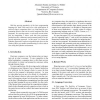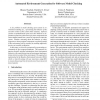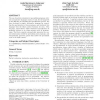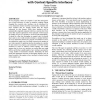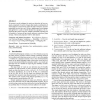112
click to vote
ECOOPW
2001
Springer
15 years 6 months ago
2001
Springer
This report gives an overview of the third ECOOP Workshop on Formal Techniques for Java Programs. It explains the motivation for such a workshop and summarizes the presentations an...
126
click to vote
CSMR
2002
IEEE
15 years 7 months ago
2002
IEEE
With the growing popularity of the Java programming language for both client and server side applications in network-centric computing, there is a rising need for programming libr...
110
click to vote
SCAM
2003
IEEE
15 years 7 months ago
2003
IEEE
Program slice is a set of statements that affect the value of variable v in a statement s. In order to calculate a program slice, we must know the dependence relations between sta...
110
click to vote
KBSE
2003
IEEE
15 years 7 months ago
2003
IEEE
A key problem in model checking open systems is environment modeling (i.e., representing the behavior of the execution context of the system under analysis). Software systems are ...
134
click to vote
PEPM
2004
ACM
15 years 7 months ago
2004
ACM
The use of partial evaluation for specializing programs written in imperative languages such as C and Java is hampered by the difficulty of controlling the specialization process....
KI
2004
Springer
15 years 7 months ago
2004
Springer
In this paper we present a new model of Java programs. We show how a program can be compiled into the model. The model can be directly used by a model-based diagnosis engine in ord...
TACAS
2005
Springer
15 years 7 months ago
2005
Springer
We present a tool for finding errors in Java programs that translates Java bytecodes into symbolic pushdown systems, which are then checked by the Moped tool [1].
101
click to vote
ISPASS
2005
IEEE
15 years 7 months ago
2005
IEEE
As Java is emerging as one of the major programming languages in software development, studying how Java applications behave on recent SMT processors is of great interest. This pa...
111
click to vote
PPPJ
2006
ACM
15 years 8 months ago
2006
ACM
In Java programs, classes are coupled to each other through the use of typed references. In order to minimize coupling without changing the executed code, interfaces can be introd...
116
click to vote
PLDI
2006
ACM
15 years 8 months ago
2006
ACM
We present a novel technique for static race detection in Java programs, comprised of a series of stages that employ a combination of static analyses to successively reduce the pa...

